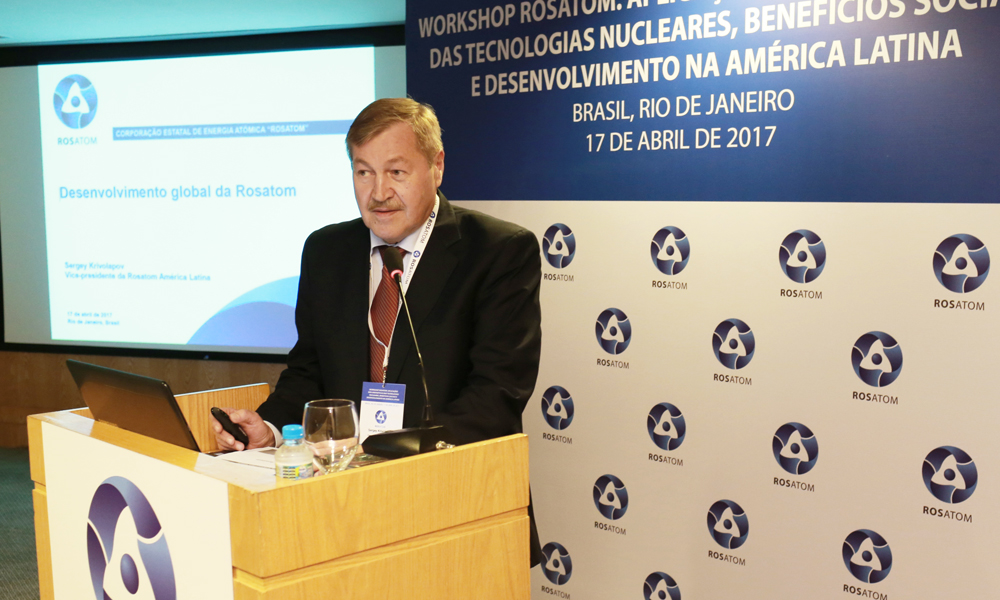
Irradiation Technologies on a Broader Scale
back to contentsThe workshop was organized by Rosatom International Network, through its regional office Rosatom America Latina. Led by Rosatom’s representatives, the discussions were focused on the development of irradiation technologies in Latin America and their use in industry, healthcare and agriculture. The workshop brought together representatives of Brazil’s nuclear industry leaders, such as Electronuclear, Eletrobras, Nuclep, Amazul, Tecnatom, etc. and public organizations, including the Brazilian National Nuclear Energy Commission (CNEN), Brazilian Agricultural Research Corporation (EMBRAPA), Brazilian Association for the Development of Nuclear Activities (ABDAN), Brazilian Institute for Nuclear Quality (IBQN), Brazilian Society of Nuclear Medicine (SBMN), and Brazilian Federation of Hospitals (FBH). It also attracted students from the Federal University of Rio de Janeiro (UFRJ).
“Our activities on the Latin American market show that irradiation technologies for agricultural, medical and industrial use are very much in demand in South America. According to the IAEA, it is South America where irradiation technologies will gain the most traction in the years to come,” Ivan Dybov, President of Rosatom America Latina, told Rosatom Newsletter. “This forecast is what prompted the idea of a regional workshop. We are very pleased to see that it brought together many colleagues from across South America. They presented the market situation and spoke much of the need to use irradiation technologies on a broader scale”.
Sergei Krivolapov, Vice-President of Rosatom América Latina introduced Rosatom’s unique capabilities, integrated offer, and updates on the company’s cooperation throughout the region. He recalled Memorandum of Understanding signed between the United Innovations Corporation (UIC) and the Brazilian company CK3, in the end of 2016, on the construction of an Irradiation Center in Brazil. “This Center is another very interesting project for us, since it will allow combining Russian competences and achievements in the radiation technology field with the experience of the Brazilian company CK3 in the domestic market.”
Leading companies of Rosatom Group shared their extensive experience in the sphere of irradiation technologies with their Latin American colleagues. Rosatom’s subsidiary Rusatom Healthcare, which specializes in promoting Russian nuclear technologies in medicine, and the Scientific Research Institute of Technical Physics and Automation (NIITFA), presented a wide range of products offered by Rosatom in this area. In particular, Konstantin Panin, a representative of Rusatom Healthcare, highlighted the construction of multi-functional facilities for radiation processing of food and medical products, from which the countries can experience economic benefits and improvement of the population’s health. Furthermore, Aleksandr Zykin, Head of NIIFTA Laboratory, presented its areas of competences and stressed, “For all task under the laws of physics there is an engineering solution available waiting to be set. This is what we have been doing for more than 60 years.”
From Brazilian side, CK3’s advisor Arminak Cherkezian provided an overview of Rosatom–CK3 joint project for the development of an irradiation plant for sterilization of medical materials. In his speech, he presented prospects of this venture, which aims to be a quality and viable option for the market that today relies only on one supplier “After today’s workshop, I’m even more convinced of the necessity of this plant. This project is going to be a great remark of Rosatom in Brazil.”
Moreover, presentations on the multiple applications and benefits of irradiation technologies in agriculture, medicine, industry, science and geology were made by representatives of the Nuclear and Energy Research Institute (IPEN), the Brazilian National Nuclear Energy Commission (CNEN), Latin American Association of Irradiation Technologies (ALATI), the secretariat of the Regional Co-operation Agreement for the Promotion of Nuclear Science and Technology in Latin America and the Caribbean (ARCAL). During its presentation, the ARCAL expressed interest in building strategic alliances with Rosatom.
“Our activities on the Latin American market show that irradiation technologies for agricultural, medical and industrial use are very much in demand in South America. According to the IAEA, it is South America where irradiation technologies will gain the most traction in the years to come,” Ivan Dybov, President of Rosatom America Latina, told the media. “This forecast is what prompted the idea of a regional workshop. We are very pleased to see that it brought together many colleagues from across South America. They presented the market situation and spoke much of the need to use irradiation technologies on a broader scale. We are very grateful to Rosatom Healthcare for its support because the workshop gave us an opportunity to present our vision of doing business in the region, share experience, show advantages over the competition, and answer a lot of technology-related questions. It should be noted that right after the workshop we received requests for equipment, and we are already working on them.”
As Mr. Dybov said, Rosatom made detailed presentations of its technologies and approach to doing business. “We presented our reference projects in Russia, Peru and other countries and discussed a possibility of expanding joint projects in isotope supplies. Izotop is now the largest supplier of medical isotopes to Brazil,” Ivan Dybov noted in an interview to RN.
According to him, this was the first event where industry experts were demonstrated a joint project of Rosatom and Brazil’s CK3 to construct a medical irradiation facility in Brazil. “As set out in the memorandum signed earlier, we are working on establishing a joint venture. We have completed a market analysis. We are about to finish a business plan and drafting a shareholders’ agreement for the new JV. This is a very important and long-awaited project for Brazil, where this industry is monopolized by a single supplier,” Mr. Dybov said.




